A Mother’s Lullaby
Others, COVID-19 , Women & GirlsContributed by: Compassion Canada
The impact of crises is never gender-neutral—and COVID-19 is no exception. Here’s why women, especially mothers, are bearing the brunt of the fallout.
Written by: Compassion Canada
“Coronavirus is like a leech. Once it catches you, it will suck you until it has had its fill.”
When the sun sinks behind the rice paddies and the house is dark and quiet, her daughter’s words play on an endless loop in Tribin’s mind. She watches as six-year-old Chiring sleeps, her dimpled hand pillowed beneath her cheek. At rest, her sweet face is peaceful. Free of the anxiety that plagues her mother.
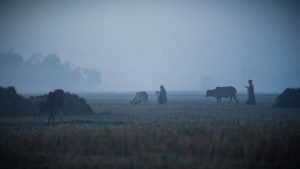
What is this new world where her children must worry about such things? And how can she keep them safe from something she cannot see?
In the soft glow of the gas lamp, Tribin rubs her sweet daughter’s back and hums a quiet lullaby. The rhythmic song fills their small home, enveloping her four sleeping daughters in words of comfort.
“I’ll give you a plate of food,” she sings. “You can then have a mouthful.”
They are reassuring words of a promise she’s not sure she can keep. Since the pandemic hit, her love—and her lullaby—is all she has to offer them.
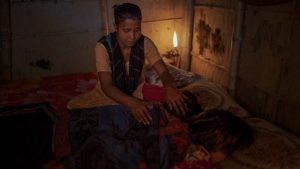
Tribin sings her daughters to sleep.
“Being a mother requires the ability to provide for my children in every situation and more, which I can’t do,” she says. “The more I thought about how the remainder of the year would go, the more I felt helpless. We prayed powerlessly, with our feeble minds having little hope.”
COVID-19 and its impact on women
The impact of crises is never gender-neutral and COVID-19 is no exception, reports UN Women. While everyone is facing unprecedented challenges, women—especially mothers—are bearing the brunt of the economic and social fallout of COVID-19.
Women have been the hardest hit by unemployment during the pandemic, remaining more likely than men to have insecure or informal work arrangements. According to The Lancet, a leading academic research journal covering infectious diseases, an estimated 740 million women are employed in the informal economy. In low-income countries, this work makes up more than two-thirds of female employment. But as countries locked down, these jobs quickly disappeared.
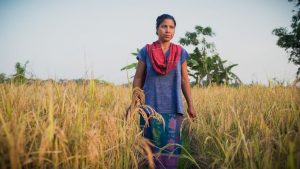
In rural Bangladesh, Tribin’s work as a contract farmer was decimated. As city dwellers flocked to their home villages to escape COVID-19, securing contract work became a nightmare. Tribin couldn’t compete.
“Creditors shut their doors and landlords hired the farmers with the lowest bid for the job. We were taken off-guard,” she says. “We were left at the mercy of miracles to go through the tough situations that we must face every day.”
Her family of six survives by eating just breakfast and dinner, filling up on hot chai in the afternoon to distract themselves from their growling bellies. Meat, which was once a weekly treat, is now a luxury they have swapped for cheaper alternatives like bottle gourd and red spinach.
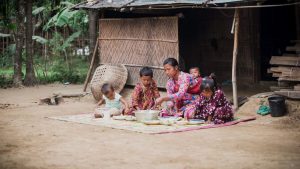
“We feared COVID, but not as much as the food scarcity that we were having,” says Tribin. “We have always been tight on food supplies, but we never let our children know the struggle that we go through to bring food on the table at the end of the day.”
Balancing employment, childcare and schooling
“Mummy goes out often in search of work,” says young Chiring. “Even though she tries hard to find jobs with the aunties in our neighbourhood, she is not able to find a job. I make sure my little sister is always playing next to me while my parents are out.”
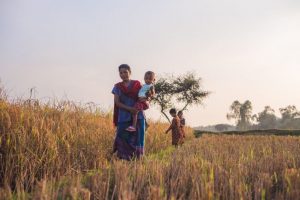
As quarantine measures restrict people to homes and close schools and day-care facilities, women like Tribin also shoulder the burden of balancing employment with childcare and schooling responsibilities. Social distancing deprives them of the support they could normally lean upon.
School closures meant Tribin’s eldest daughters, Maloti and Chiring, joined little sisters Chrisring and baby Sharika at home. Because education offers an escape from a life of poverty, Tribin fears the long-term impact of her girls missing out on classes, especially since her search for work means she can’t tutor them.
“I worry about my children’s education,” she says. “I fear that my children will follow us into the fields [as farmers] and not move forward from our present state.”
Believing in the possibility of miracles
Throughout all the struggles that the days bring, one of the biggest lessons for Tribin has been where true happiness comes from: not from possessions or physical things, but through caring for one another. Experiencing how Compassion’s local church partner has supported her family at a time when the entire world is facing the hardships of COVID-19 has been beyond her imagination.
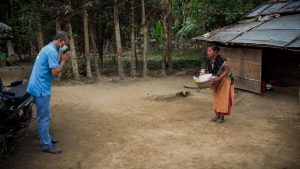
“Without Compassion’s support, we would have to adapt to begging or selling ourselves to landlords to work as their housemaids,” says Tribin. “The help makes us feel that when we don’t have any options, we always have a source which would help us make ends meet.”
The regular food baskets packed with lentils, eggs, cooking oil and other essentials provided through Chiring’s sponsorship have been a lifeline for their family. At a time when people in their community are taking out desperate loans that are beyond their capacity to repay, Tribin has been able to put food on the table for her daughters, something that once felt impossible.
“The pandemic has made us believe in the possibility of miracles,” she says.

Tonight, she kisses Chiring’s forehead and smooths back her hair. She blows out the candle, plunging the room into darkness. Tribin doesn’t know what tomorrow will bring. But her love for her daughters—and the care from Compassion’s partner—will remain unchanged. “God has taught us that even when times are dark,” she says, “He will show us a way through the darkness.”
____
You can help bear the load that moms like Tribin carry each day to provide for their children so that they too can believe in the possibility of miracles.
Story by Zoe Noakes with Laura Phillips
Photos and Video by J. Sangma, Ryan Johnson and Grayshack
Originally published on: https://www.compassion.ca/blog/a-mothers-lullaby/

